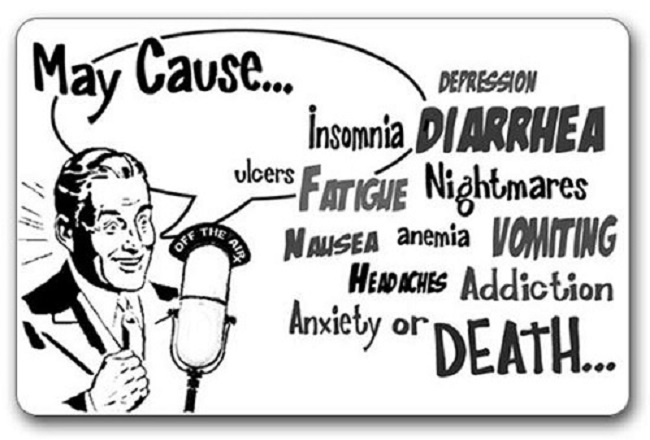I often compare adverse drug reactions to earthquakes. People die in earthquakes. More people die from taking pharmaceuticals. Per Ethicist, Dr. Donald W. Light, “Every week, about 53,000 excess hospitalizations and about 2,400 excess deaths occur in the United States among people taking properly prescribed drugs to be healthier. One in every five drugs approved ends up causing serious harm, while one in ten provide substantial benefit compared to existing, established drugs.”
Earthquakes destroy lives, homes, towns, bridges, cities, etc. Likewise, pharmaceuticals can destroy muscles and nerves, induce peripheral neuropathy and mental illness, lead to a variety of multi-symptom chronic diseases, etc.
Earthquakes happen suddenly and without warning. Systemic illness brought on by pharmaceuticals often also happens suddenly and without warning. A myriad of symptoms can afflict a victim of pharmaceuticals in a matter of weeks or months – essentially simultaneously. It is as if every cell in the body of the victim has been shaken and damaged – leaving chronic illness and pain where health, wellness and vitality once stood.
There is ongoing damage after an earthquake. Aftershocks occur. For those suffering from chronic illness brought on by a pharmaceutical, relapses can occur. A new insult to the system, even one that would be benign to someone who was not already knocked down, can throw a person suffering from an adverse drug reaction into a tailspin of pain and suffering.
There is collateral damage after an earthquake when deaths occur not from the shaking of the earth itself, but from the damage done by the earthquake. When a person is hit by a pharmaceutical induced illness, there is also collateral damage. Not only does the health of the victim suffer, but other areas of life do too. Their relationships are burdened. Jobs are often lost. Homes are often lost. Money is lost.
Infrastructure is damaged when an earthquake hits a city. Systemic, chronic pharmaceutical induced illnesses (as opposed to allergic reactions or transient, easy to treat “side-effects”) damage multiple systems of infrastructure within a victim’s body. Systems upon which all aspects of health are built – the microbiome, the endocrine system, mitochondria, cellular homeostasis, etc. – are shaken and damaged by pharmaceuticals.
Earthquakes are terrifying to live through. So are adverse drug reactions.
Earthquakes vary in intensity. So do adverse drug reactions.
Some cities recover from the earthquake that knocked them down. Others are so devastated, so destroyed, that they will, sadly, never recover. The same is true for victims of adverse drug reactions.
The metaphor is apt but it is not complete (no metaphors ever are). There is one huge way that adverse drug reactions are nothing like earthquakes.
Earthquakes are natural disasters. Adverse reactions to pharmaceuticals are man-made disasters.
No one is held responsible for the earthquake, because no one caused the earthquake. It is a natural event and we are all at nature’s mercy. Pharmaceutical induced illnesses are not something that happens in nature or something that happens because of fate; they are something that occurs because of the negligence of companies and the humans that operate those companies. The makers of pharmaceuticals should be held responsible for the damage that their products do. There should be justice for the victims of pharmaceuticals.
If you’re hurt by a drug, you can sue, right? After all, the United States is the most litigious country in the world. People sue for all sorts of things all the time, surely those who are legitimately hurt by pharmaceuticals have legal recourse, right? And the legal system must be keeping pharmaceutical companies from hurting people, right?
Unfortunately for both the victims of pharmaceuticals, justice for victims is rare. Victims are unable to gain justice for multiple reasons, one of which being – if the “side-effect” of a drug that you suffer from is listed on the warning label for the drug, you can’t sue the drug companies for failure to warn. For example, if you suffer from repeated tendon ruptures that lead to pain and disability after taking Avelox/moxifloxacin, a fluoroquinolone antibiotic, you can’t sue the manufacturer (Bayer) because the warning label states that Avelox and other fluoroquinolones “are associated with an increased risk of tendinitis and tendon rupture in all ages.” Never mind that the warning label says nowhere that the structure of every tendon in your body can be altered permanently by the drug – lawyers won’t take the case because patients were “warned” by the label.
The Supreme Court did victims of pharmaceuticals no favor when they ruled on June 24, 2013, that generic drug manufacturers could not be held liable for the effects of the pharmaceuticals that they manufacture. A New York Times piece pointed out that, “The decision is a significant victory for the generic drug industry, but further narrows the recourse for people who are injured by such drugs.” People who have been hurt by a drug manufactured by a generic drug company have no recourse now – no chance for justice – regardless of how horribly they are harmed by a drug. Lawyers aren’t even looking at cases for people hurt by generic drugs.
Justice isn’t easy to come by. It rarely happens for victims of pharmaceuticals.
Pharmaceutical induced illnesses are just like earthquakes. No one is held responsible for the damage done. There is no justice for the victims. They are left to pick up the rubble of their lives on their own.
Information about Fluoroquinolone Toxicity
Information about the author, and adverse reactions to fluoroquinolone antibiotics (Cipro/ciprofloxacin, Levaquin/levofloxacin, Avelox/moxifloxacin and Floxin/ofloxacin) can be found on Lisa Bloomquist’s site, www.floxiehope.com.
We Need Your Help
More people than ever are reading Hormones Matter, a testament to the need for independent voices in health and medicine. We are not funded and accept limited advertising. Unlike many health sites, we don’t force you to purchase a subscription. We believe health information should be open to all. If you read Hormones Matter, like it, please help support it. Contribute now.
Yes, I would like to support Hormones Matter.
Write for Us
Have you experienced the adverse drug reaction earthquake? Share your experience. Help spread awareness. Contact us.
This article was originally published on June 23, 2014.
























